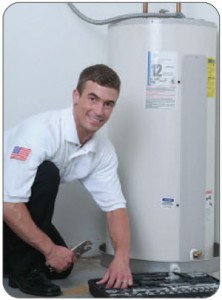Water Heater Repair / Replacement

Advanced Plumbing Service only carries what we deem to be the best water heaters in the industry, American Standard for our tank water heaters and Rinnai for our tankless water heaters. Over the years we have tried many different brands of water heaters, but none have held up to the standards that we expect as American Standard and Rinnai have.
When Advanced Plumbing Service installs your water heater, you can rest assured that it will be installed per Code and done right the first time.
Our trucks carry a 40-gallon American Standard water heater on them at all times. If another size or type is needed, we will deliver it to you immediately so we can get you back in hot water as soon as possible.
Don’t wait for your hot water heater to leak and cause damage to your home. The average tank water heater will last 8-10 years, a tankless will last up to 20 years depending on your water conditions.
If you have any questions or concerns, please feel free to contact us today and we will be on our way to look at your water heater. For more information on American Standard water heaters visit the first link provided below and the second for Rinnai tankless water heaters.
Tips & Information
Click on the topics below for tips and information regarding your water heater.
Your water heater might look like a problem-fee, no worries appliance, but when it is improperly installed or maintained, it’s a potential ballistic missile that could erupt with enough force to lift your house off its foundation. The Consumer Product Safety Commission says that just about every day someone gets injured or killed by a flammable vapor explosion sparked by a gas water heater.
It’s been our experience that the same mistakes are made over and over on water heater installations:
- Bad flues
- Improper clearances
- Installation instructions ignored
- National and Local plumbing safety codes disregarded
National, State, and Local plumbing safety codes are essential to protect you, the consumer. So how do you know if your water heater is safe, meeting all the necessary plumbing codes? Our plumbing professional will inspect your water heater system for any code violations or for any new code requirements that have changed since your water heater was installed.
What Does The Inside Of Your Water Heater Look Like?
Does the inside of your heater look like this?
- Dirt
- Mineral
- Deposits
- Rust
- Gunk
- Muck
Is Your Heater Dying a Premature Death From
- Sediment build-up
- Internal rusting
- External leakage

Sediment Build-Up
- Causes heating element burn-out
- Can increase energy use
- Can initiate overheating
- Triggers aggravating noises
- Causes annoying vibrations
- Allows bacteria to grow
- Produces an unpleasant odor
- Never Buy Another Water Heater: When properly maintained, a water heater can last up to 20, 30 and even 40 years. Could this be the last water heater that you will ever need to purchase?
- Safety: The Consumer Product Safety Commission says just about every day someone gets injured or killed by an exploding water heater. There are several situations that can cause a hot water heater to explode (water pressure, flammable vapor in a gas water heater, etc.) With our annual “precision tune-up and professional inspection”, you won’t have to worry… we will look for any conditions that may be unsafe for and your family.
- Reduce Costly Breakdowns: By giving your water heater the care that it needs, you will have fewer components burn out; therefore, reducing the need for unnecessary repairs.
- Peace & Quiet: Water heaters that have sediment build-up on the bottom can become very noisy. As the burners heat the bottom of the tank, gas bubbles form under the sediment, the thumping and popping noises are created by the gas bubbles escaping from under the sediment. Proper maintenance can “flush” the sediment out to make sure that you have your “Peace & Quiet”.
- Energy Savings: Research shows that properly maintained water heaters can reduce your energy costs by 12-15%

- Combustion Chamber Care
- 5-Point Ionic Leak Detection
- Evaluation of Sacrificial Anode
- Sediment System Flushing
- Replace Thermocouple
- Vent Inspection
- Back Draft Testing
- Gas Leak Detection
- Check Stabilization & Balancing
- Check Tank Expansion Pressure
- Inspect Emergency Safety
- Relief Valves
- Test T & P Valve
- Aerator Sediment Removal

